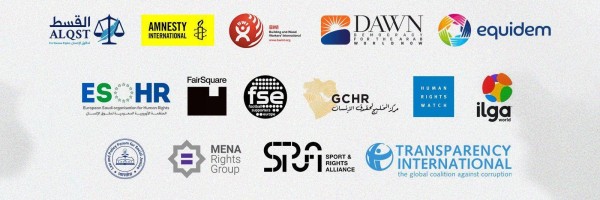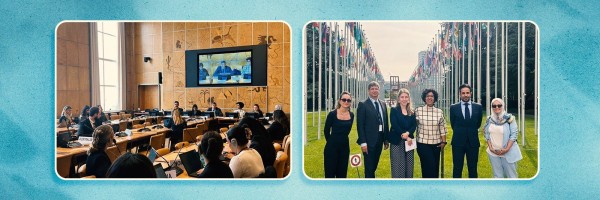ALQST recently learned that Saudi Arabia’s official Human Rights Commission (HRC) has hired a Washington-based public relations company for a year-long contract, worth an annual sum of $684,000, to handle strategic communications, media training, editorial services and polling in the United States, with further fees payable for additional research and services. ALQST has seen a copy of the contract with Qorvis Communications, which was filed on 16 April 2020 with the US Department of Justice under the Foreign Agents Registration Act and reported in the American PR industry press.
The Saudi HRC was established in 2005, officially “to promote and protect human rights in accordance with international standards, to increase awareness of such rights and to contribute to ensuring that such rights are enforced in the light of the sharia”. Its website says it is “the government body responsible for issuing opinions and advice on human rights matters”, that it “enjoys full independence in the performance of its statutory functions", but also that it “shall report directly to the King”.
Sycophantic praise
In practice, the Commission operates as an arm of the Saudi authorities’ propaganda machine. It labours to give the impression that human rights issues are finally being addressed in the kingdom, despite evidence to the contrary. A sample news story from the Saudi HRC website reports a recent virtual meeting of the Commission’s governing Council, which uncritically “noted the Kingdom’s efforts in protecting and promoting human rights. These developments... are driven by a strong political will that has played a part in moving the Kingdom, under the leadership of the Custodian of the Two Holy Mosques King Salman bin Abdulaziz and His Royal Highness Crown Prince Mohamed bin Salman, from commitments to practices in the area of promoting and protecting human rights.” No evidence or details were mentioned.
Another recent news item on the website was headlined “Council of the Human Rights Commission lauds HRH the Crown Prince’s leadership of the Corona crisis file and the successes achieved”. Such irrelevant sycophancy – without even any reference to human rights aspects of the pandemic – destroys any credibility or claim to independence for an agency tasked with protecting human rights, especially when the authorities themselves are seen (by genuinely independent monitors) as the prime violators of those rights.
Blatant propaganda
As well as promoting a rosy image on its website, the Saudi HRC actively pushes its message in high-level meetings at home and abroad, especially in the West, with foreign dignitaries, embassies and NGOs. Commission representatives urge their interlocutors to stop criticising human rights violations in Saudi Arabia, not only assuring them that reform is on the way but also trying to justify some of the authorities’ worst excesses. They have attempted to validate the arbitrary arrests of women’s rights activists and human rights defenders on the grounds that they campaigned “for the right thing at the wrong time”, and hinted that some Islamic scholars now in prison had opposed Crown Prince Mohammed bin Salman’s vaunted reforms, as if this justified their arbitrary arrest and detention.
ALQST views these activities as unbefitting a human rights organisation.
The Saudi HRC is also often guilty of misrepresenting facts. On 26 April 2020 the Commission’s president, Awwad Alawwad, “welcomed” a royal decree – which has still not been officially published – purportedly ending application of the death penalty for individuals convicted of crimes committed while they were minors. On closer examination the supposed reform proved to contain loopholes rendering it virtually meaningless.
In ALQST’s view it is not the job of a human rights agency to promote flawed measures that have not even been implemented.
Failure to protect victims
More seriously, the Saudi HRC has signally failed to protect the women human rights defenders arrested and tortured under interrogation in 2018, several of whom remain in prison without having been convicted of any crime. Commission representatives visited the women in prison, interviewed them, heard their accounts of brutal torture and sexual harassment, and promised to submit written reports on their cases to King Salman. The reports were never published, and the king has done nothing to end and remedy these gross violations.
Questions and (free) advice
ALQST has a number of questions regarding the Commission’s expensive public relations contract with Qorvis:
- Is its purpose to improve the image of the Saudi HRC itself, or of the Kingdom of Saudi Arabia? Both these things could be better achieved by actually tackling the kingdom’s appalling human rights record.
- Why is the Saudi HRC commissioning polling in the United States? Is it more interested in the opinions of Americans than in the opinions, welfare and human rights of Saudi citizens and foreign residents in Saudi Arabia?
- And does the HRC actually understand the work of a supposedly independent human rights body? Its role should be to monitor, report and work to end human rights violations, rather than whitewash and glorify its masters.
ALQST would like to offer the Saudi Human Rights Commission and its hired consultants at Qorvis the following advice – free of charge – which we are also sending to HRC President Awwad Alawwad and Qorvis President Michael J. Petruzzello:
The HRC at present is widely regarded as an obedient servant of the Saudi authorities. To remedy its lack of credibility it should:
- defend human rights, not the Saudi authorities;
- establish its independence by first of all refraining from uncritically praising the authorities’ announcements;
- publish regular reports on violations and alleged violations of individual human rights; investigate them and hold the perpetrators accountable;
- call for the immediate release of all prisoners of conscience – the king or crown prince could do this at any moment if they wished;
- make public demands on the authorities to end practices that systematically deny citizens and residents their rights, including but not limited to:
- arbitrary arrests, enforced disappearances, torture and ill-treatment in custody;
- political control of the judiciary, unfair trials and lack of transparency in judicial proceedings;
- the system of male guardianship that prevents adult women from exercising many of their basic rights; and
- use of the death penalty, especially for non-violent or vaguely worded offences and against minors;
- undertake genuinely independent, unannounced visits to prisons, police stations and other formal and informal places of detention to monitor adherence to human rights principles and proper procedures, publish its findings and follow up with meaningful action; and
- submit its own, independent, reports and comments to UN human rights mechanisms instead of attending as part of, and even chairing, the official Saudi delegation.




